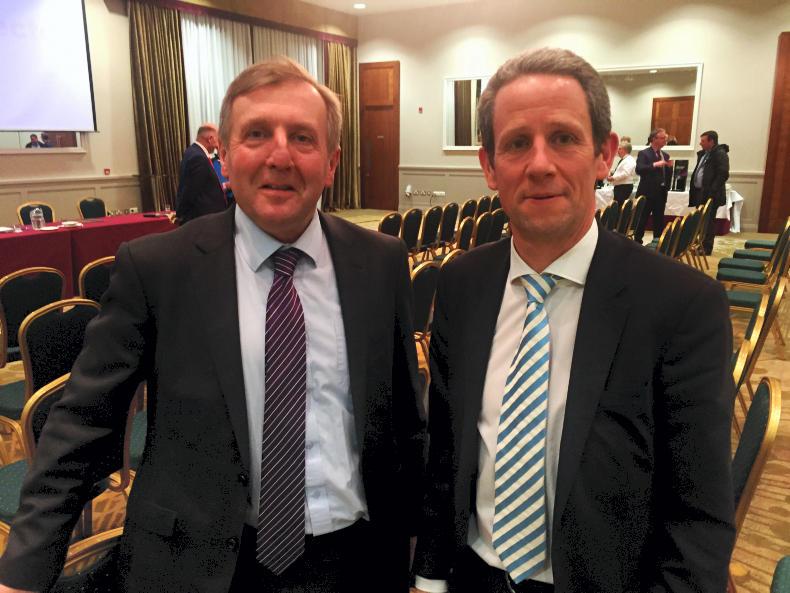Paul Savage, head of the EU and international trade division at the Department of Agriculture, said this Wednesday that his office has had direct contacts with the British Government to prepare for Brexit.
We’ve been maintaining close contact with our counterparts in the North and in the UK
“We’ve seen a lot of north-south engagement and also east-west – Dublin-London – again from a central government point of view, but also from an agri-food perspective,” Savage told the all-island dialogue on Brexit and agriculture in Gormanston, Co Meath. “We’ve been maintaining close contact with our counterparts in the North and in the UK, trying to monitor what’s going on, trying to anticipate to the extent that we can where the negotiations might go.”
Listen to an interview with Paul Savage in our podcast below:
Listen to “How the Department of Agriculture tackles Brexit” on Spreaker.
Savage also said that the Department had multiple engagements with authorities at EU level and in other member states, with plans for more formal bilateral contacts with key European agriculture ministers in the coming weeks. The Department has also made contact with the EU’s chief negotiatior on Brexit, Michel Barnier.
“We’ve been talking with the Commission and we’ve started to talk with the Barnier task force in terms of what our key priorities will be in the negotiations, and again agri-food features very strongly in that because it is probably the most exposed sector,” Savage said.
Agriculture Minister Michael Creed added he expected Spain, France, Germany, Belgium, the Netherlands and Denmark to join Ireland as key players to defend the continuation of easy agri-food trade with the UK after Brexit. He added that Irish bilateral efforts were also targeting the next Bulgarian, Austrian and Estonian presidencies of the EU to make sure that “they are uniquely aware of our position”.
Savage said that three Department staff were now working full-time in a dedicated Brexit unit, with himself and an assistant secretary also heavily involved at senior level.
99% of the vegetables, 80% of the wood panels and 70% of the sawn wood exported by the Republic go to the UK
This second part of the all-island dialogue followed on from the meeting with the livestock industry last December and focused on grain and feed, horticulture and forestry. Minister of State for Food, Horticulture and Forestry Andrew Doyle highlighting that 99% of the vegetables, 80% of the wood panels and 70% of the sawn wood exported by the Republic go to the UK.
Read more
Preparations can simplify Irish border after Brexit
Full coverage: Brexit
Paul Savage, head of the EU and international trade division at the Department of Agriculture, said this Wednesday that his office has had direct contacts with the British Government to prepare for Brexit.
We’ve been maintaining close contact with our counterparts in the North and in the UK
“We’ve seen a lot of north-south engagement and also east-west – Dublin-London – again from a central government point of view, but also from an agri-food perspective,” Savage told the all-island dialogue on Brexit and agriculture in Gormanston, Co Meath. “We’ve been maintaining close contact with our counterparts in the North and in the UK, trying to monitor what’s going on, trying to anticipate to the extent that we can where the negotiations might go.”
Listen to an interview with Paul Savage in our podcast below:
Listen to “How the Department of Agriculture tackles Brexit” on Spreaker.
Savage also said that the Department had multiple engagements with authorities at EU level and in other member states, with plans for more formal bilateral contacts with key European agriculture ministers in the coming weeks. The Department has also made contact with the EU’s chief negotiatior on Brexit, Michel Barnier.
“We’ve been talking with the Commission and we’ve started to talk with the Barnier task force in terms of what our key priorities will be in the negotiations, and again agri-food features very strongly in that because it is probably the most exposed sector,” Savage said.
Agriculture Minister Michael Creed added he expected Spain, France, Germany, Belgium, the Netherlands and Denmark to join Ireland as key players to defend the continuation of easy agri-food trade with the UK after Brexit. He added that Irish bilateral efforts were also targeting the next Bulgarian, Austrian and Estonian presidencies of the EU to make sure that “they are uniquely aware of our position”.
Savage said that three Department staff were now working full-time in a dedicated Brexit unit, with himself and an assistant secretary also heavily involved at senior level.
99% of the vegetables, 80% of the wood panels and 70% of the sawn wood exported by the Republic go to the UK
This second part of the all-island dialogue followed on from the meeting with the livestock industry last December and focused on grain and feed, horticulture and forestry. Minister of State for Food, Horticulture and Forestry Andrew Doyle highlighting that 99% of the vegetables, 80% of the wood panels and 70% of the sawn wood exported by the Republic go to the UK.
Read more
Preparations can simplify Irish border after Brexit
Full coverage: Brexit






 This is a subscriber-only article
This is a subscriber-only article










SHARING OPTIONS: